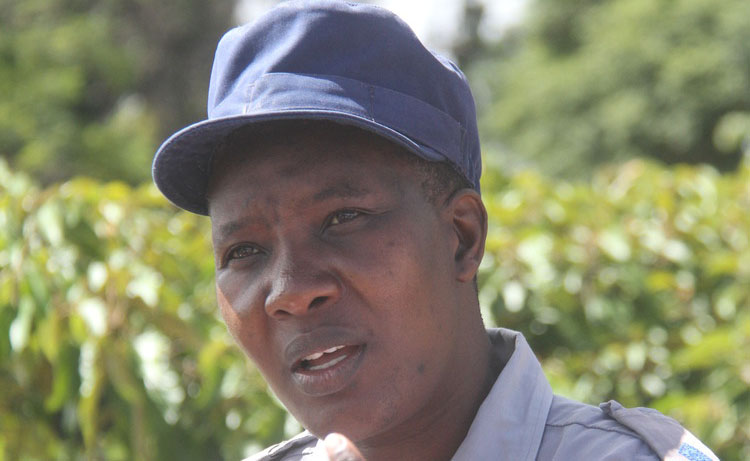Nurturing dogs into star cops

Leroy Dzenga Features Writer
Inspired by the days her brother, a policeman in the 80s, used to take her to police displays, Assistant Inspector Tambudzai Madzokotera knew she wanted to fight crime.
Not only did she want to serve and protect citizens of Zimbabwe, she wanted to do it in a special way.
Her love for dogs and hate for crime led her to join the police force, starting out her career in Kadoma.
“I joined the force and section in 1997 and I was a dog handler,” Asst Insp Madzokotera said.
It was during this time that she found a companion and her friend in the trade.
“When I was chosen to be a dog handler that is when I was paired with Patrol Dog (PD) Dante when it was 12-weeks-old.
“I was paired by my former partner and dog PD Dante since he was a puppy. For six years we had grown an understanding that it became a part of my life,” she said.
Asst Insp Madzokotera didn’t know that in following her dreams she was about to break new ground.
She became the first female dog handler in the Zimbabwe Republic Police.
“Naturally I like dogs. I had always been fascinated by the way police dogs behave at gatherings and I thought I would try it out,” she said.
Despite the knowledge that she was venturing into a male-dominated field, her then superior’s skills with the dogs were too dazzling for her not to emulate.
“I was challenged to continue working hard in the dog patrol by my superior at that time, Sergeant Chitate. I learnt the ropes with help and guidance from him,” she said.
His communication with the dog whenever duty arose made her envious, a feeling that made her follow his footsteps.
Asst Insp Madzokotera became close with her dog Dante, she solved a lot of cases with his assistance.
One particular case they conquered together still lingers in her memory triggering a smile-filled reminiscence as she recounted the triumph.
“I remember one case during my junior years in Kadoma. We were called to cover a stocktheft case together with a colleague called Constable Mutsvandiyani who worked with his dog PD Lance.”
On this day, a delayed alert from the informant almost made them lose their dogs.
“As we approached the area where the suspects were hiding, the informant alerted us abruptly and the suspects escaped,” she said.
Since it was getting dark and drizzling, they had to release the dogs to chase after the suspects.
“We released the two dogs and one dog, Cst Mustandiyani’s PD Lance, returned barking signalling that it had found something. It led us to a bag containing knives which were being used by the cattle rustlers,” she said.
After the dog led them to the bag, it ran into the dark, trying to find the assailants together with Asst Insp Madzokotera’s PD Dante.
“The dogs disappeared until late at night and we had to go back to the station.
The following morning, we trailed the dogs for about five kilometres,” said Asst Insp Madzokotera.

Assistant Inspector Tambudzai Madzokotera explains a point, while a Labrador Retriever searches for a planted drug during a training drill
When they were gearing themselves to explain to their superiors what had happened to the dogs after a long walk, they got one of the best sights in their law enforcement lives.
“When we got to the main road, we saw the perpetrator lying on the ground under guard from the dogs,” she said explaining the relief she experienced when she found her companion after a scare.
It is moments like these which made it difficult for Asst Insp Madzokotera to cope with separation from PD Dante when she changed departments in 2005.
Despite having stints in prosecution and other departments, she found herself back at the Canine Training School as a dog trainer, a role she holds and relishes.
For a dog to be obedient and be able to aid in fighting crime, it has to undergo rigorous training.
The Zimbabwe Republic Police has a special department known as the Canine Training School which handles the training.
Superintendent Chirango Mandizvo, a staff officer at the Canine Training School, says it takes a special calling to work with the dogs.
“For a police officer to be a dog handler or trainer, they have to be passionate and patient.
“There has to be courtesy and one needs to be able to take care of the dog. The handler has to communicate with the dog for coordination in the field,” Superintendent Mandizvo said.
The communication is vital, considering that when one gets a Patrol Dog, they are acquainted with it for as long as it serves the police force.
“When a puppy is born, we keep it here for 12 weeks. After that we send it to the station for it to socialise with its potential handler,” he said.
This is to foster a friendship between the dog and the police officer it will be working with.
The socialisation process lasts 12 months.
“When the handler and their patrol dog socialise for 12 months, they are invited back to the Canine Training School to undergo full course training.
The course is eight weeks for drug dogs and 12 weeks for patrol dogs,” said Superintendent Mandizvo.
These dogs are treated like any other member of the police force, they have force numbers and have a salutation in their names, “Patrol Dog” which is usually shortened to PD.
When a police officer is paired with a dog, they work together until the dog is retired.
Upon retirement, the dogs are brought back to the kennels at the Canine Training School.
They keep them until someone applies to foster them. The applications are approved personally by the Commissioner-General of Police after rigorous evaluations assessing the applicant’s suitability.
ZRP says that the dogs assist them in fighting crime and the statistics are testament to that.
According to the ZRP, in 2016 the Dog Section attended to 1 180 scenes and 5 695 people were arrested.
The Dog Section also helped recover stolen property worth $121 333,68. Their usefulness has continued into 2017.
“In January 2017 ZRP Masvingo Canine cleared 15 armed robbery and theft cases at ZRP Chikato, Masvingo Central and Zaka following the arrest of seven accused persons.
“The accused persons were each sentenced to seven years with labour,” read the report compiled by the ZRP.
Another notable case in which the Dog Section helped solve was the drug bust at the Harare International Airport in February 2017.
Drug sniffer dogs helped in the apprehension of a person who wanted to bring into the country 300 grammes of cocaine they had hidden in their private parts.
The case is still being heard at the courts.
Training supervisor at the Canine Training School, Inspector Nicodemus Danga, who has worked with dogs since 1998, says there are specific breeds they prefer to work with.
“We have specific breeds for patrol dogs, which are German Shepherd and Rottweiler. These breeds are among the most intelligent and their comprehension comes in handy in the field,” he said.
“Our drug dogs are Labrador Retrievers, they can extract drugs from any hidden place. They also have a sharp sense of smell which comes in handy,” said Inspector Danga.
Inspector Danga said a dog can be taught to execute any task.
The only dogs they don’t deal with are those that are gun shy.
“We do not have a list of things dogs can or can’t do. We just teach them according to the tasks at hand. Our dogs can shoot guns and hoist the flag, among other things,” he said.
This explains the spectacle the country was treated to in 2012 when PD Spark drove a car in front of a captive audience at the National Sports Stadium during Independence Day celebrations.
All the theatrics displayed by the police team and their dogs at public events are testament to a lot of hard work that goes on behind the scenes.
Of the four resident dog trainers at the ZRP Canine Training School, Asst Insp Tambudzai Madzokotera remains the only woman, blending seamlessly with her counterparts in training the nation’s patrol dogs.
- Feedback : [email protected]









Comments